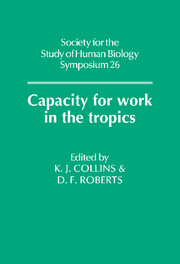Book contents
- Frontmatter
- Contents
- Preface
- Measurement of Working Capacity in Populations
- Functional Consequences of Malnutrition
- Growth, Stature and Muscular Efficiency
- Ethnic and Socio-Cultural Differences in Working Capacity
- Energy Expenditure and Endemic Disease
- Research Models in Tropical Ecosystems
- Biosocial consequences of illness among small scale farmers: a research design
- The tea plantation as a research ecosystem
- Index
Biosocial consequences of illness among small scale farmers: a research design
Published online by Cambridge University Press: 15 March 2010
- Frontmatter
- Contents
- Preface
- Measurement of Working Capacity in Populations
- Functional Consequences of Malnutrition
- Growth, Stature and Muscular Efficiency
- Ethnic and Socio-Cultural Differences in Working Capacity
- Energy Expenditure and Endemic Disease
- Research Models in Tropical Ecosystems
- Biosocial consequences of illness among small scale farmers: a research design
- The tea plantation as a research ecosystem
- Index
Summary
HUMAN BIOLOGICAL RESEARCH IN THE TROPICS
Widespread recognition of deteriorating conditions in the tropics has focused attention on the rapid, interdependent and frequently irreversible changes taking place throughout this region. Among these changes are a growing susceptibility of human populations to the effects of drought, deforestation, degradation of mountain resources, disease, and demographic shifts as people attempt to migrate to better conditions. Such changes have not only eroded critical relationships between human groups and their environment, but have reordered socioeconomic relationships within and between groups. As a consequence, people throughout the tropics are facing growing challenges to their self sufficiency, and in increasing numbers are trying to subsist under truly marginal conditions.
Although these conditions appear most acute in tropical Africa, they apply to large areas of Latin America and Asia as well. In comparing indicators of well-being (e.g. morbidity, mortality, under nutrition, rural out-migration, per capita food production, or foreign dependency) in the Tropical World with any other major region, the immensity of the problem is readily discernible (Buchanan, 1964; W.H.O.,” 1979, 1980; World Bank, 1980a,b; U.N., 1982; Pellet, 1983). In fact, the borders of the Tropical and Third Worlds are conspicuously similar. This suggests that either unique and serious impediments to meeting basic biological and social needs operate upon each of the varied tropical environments, or external political economic conditions are exerting a similar set of pressures across the tropics and on its people.
- Type
- Chapter
- Information
- Capacity for Work in the Tropics , pp. 249 - 276Publisher: Cambridge University PressPrint publication year: 1988
- 26
- Cited by



